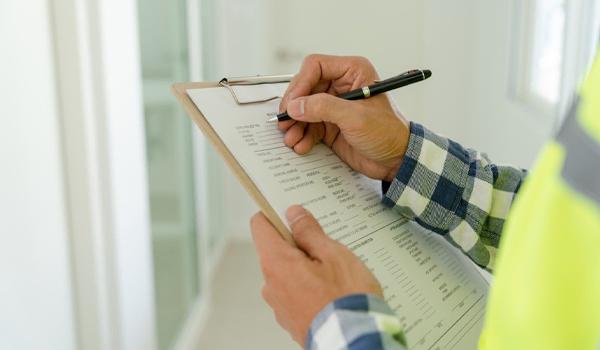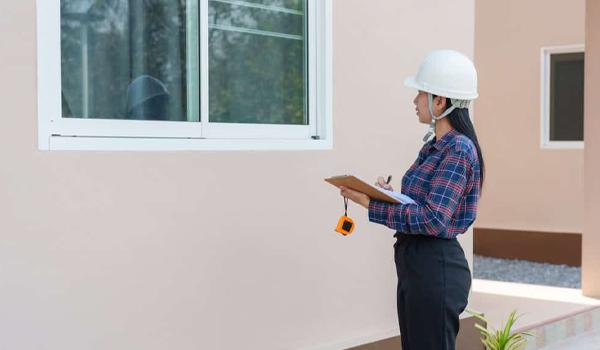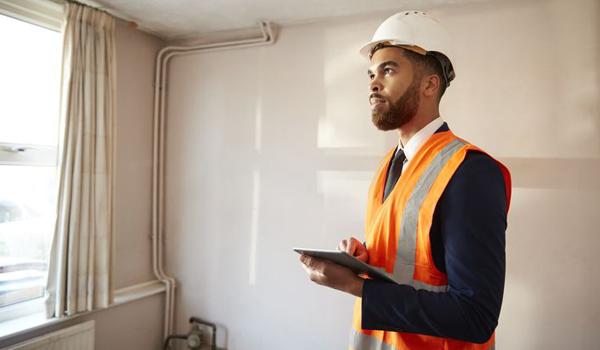Home Buying Made Safer: Complete Buyer Home Inspection Checklist

An informed buyer is a protected buyer. That’s where the buyer home inspection comes in, giving you all the information you need to make confident purchasing decisions.
In this guide, we’ll answer the most important questions about home purchase inspection, its process, how it differs from homeowner inspection, and how you can find a reputable inspector.
Buyer Home Inspection Checklist PDF
What is a buyer home inspection?
Buyer’s inspection is a full assessment of a home’s condition conducted by a professional home inspector. As you’d expect, this inspection is arranged by potential buyers before finalizing the purchase.
Such a home purchase inspection isn’t legally required, but it’s highly recommended as a condition of the purchase offer. The report that buyers later receive flags any detected issues, and is a great asset to negotiate repairs or price adjustments.
What is a Homeowner Inspection?
Similar to a buyer’s inspection, a homeowner's inspection is also a visual evaluation of the property's condition. However, it is initiated by current homeowners for different purposes including preventative maintenance, safety assurance, and insurance compliance.
It is recommended that homeowners have the property inspected at least annually, or more frequently if they live in older homes. And if they are planning to sell the house, they can schedule a pre-listing inspection.
What a Home Purchase Inspection Includes
As mentioned, the home inspection before buying a house is a visual assessment. It doesn’t go beyond readily available systems/components, and the inspector won’t use specialized equipment.
Their goal is to identify significant issues that could affect the property's value and safety. The detailed checklist can vary slightly depending on the inspector and local conditions, but a comprehensive inspection for house buying usually covers these areas:
- Roof
- Siding/Exterior Walls
- Foundation
- Floors
- Windows and Doors
- Garage
- Landscaping (limited)
- Plumbing System
- Electrical System
- HVAC Systems
- Insulation (where accessible)
- Attic and Crawl Space
- Interior Walls and Ceilings
- Kitchen Appliances
- Bathrooms
Buyer’s Inspection Process
A home inspection prior to purchase is scheduled after the buyer makes an offer and before the deal closes. It usually lasts 1-4 hours and involves taking photos and detailed notes.
It’s recommended that buyers accompany the inspector and ask questions regarding potential concerns.
What Happens After the Inspection?
Within 24-48 hours, the inspector provides a detailed report of their findings, necessary repairs, and areas that need closer examination. After reviewing the report, the buyer can decide how to proceed. Depending on the severity of the problem, they could …
- Negotiate with the seller to repair identified issues or lower the price;
- Seek a second opinion to assess the cost of repairs.
- Or walk away from the deal;
The seller too may agree to the requests, counteroffer, or refuse to make any changes. After reaching an agreement, the parties can close the deal. If not, the agreement fails, and the buyer can recover their inspection fee (depending on the purchase contract conditions).
Inspection for House Buying, Is It Required for New Builds?
Absolutely. Getting a house inspected before buying it is not limited to old buildings. New homes are also prone to construction defects, code violations, or issues that may not be apparent during a standard walkthrough.
A qualified home inspector can provide you with all the info you might need.
How to Choose a Home Inspector for Buying a House?
Start by seeking recommendations from your real estate agent, friends, and family. Verify the inspector's licensing, insurance, and experience. Also, check online reviews and ratings from previous clients.
Finally, interview several candidates, ask about their work system, and report details to find the person who is the most thorough and communicative.
To make this process easier and faster, submit your request at Houmse, get free quotes, and have access to a list of professionals in your region (along with their expertise, added values, covered regions, client reviews, etc.)
Frequently Asked Questions
How long does a home inspection before purchase take?
The inspection typically takes 1-4 hours, and the report will be ready within 1-2 days.
How much does a buyer’s inspection cost?
It typically costs between $300 and $600 depending on the property’s size, age, location, and a few other factors.
Who pays for a home inspection before closing?
While sellers should pay for pre-listing and homeowner inspection, the buyer should pay for house inspection before buying. However, this can be negotiated as part of the purchase agreement.
What fixes are mandatory after the inspection?
Sellers are not legally obligated to repair or make changes, but they need to accept the buyer’s reasonable requests to close the deal.
Is home inspection required for mortgage?
Home inspection for mortgage is not required, unless it is one of the approval conditions. It also can help avoid unexpected issues and expenses.
- In this post:
- What is a buyer home inspection?
- What is a Homeowner Inspection?
- What a Home Purchase Inspection Includes
- Buyer’s Inspection Process
- Inspection for House Buying, Is It Required for New Builds?
- How to Choose a Home Inspector for Buying a House?
- Frequently Asked Questions






